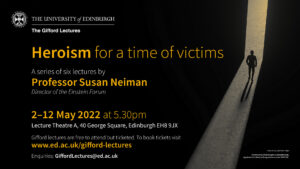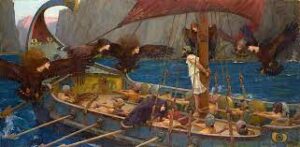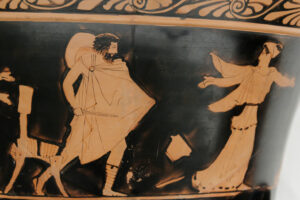Lecture 2. Odysseus and his critics: The first modern Hero
 Lecture 2. Odysseus and his critics: The first modern Hero
Lecture 2. Odysseus and his critics: The first modern Hero
‘Is it really wine-dark?’
Our second Gifford Lecture of the 2022 series examines the first hero of modern times- Odysseus- as much admired as criticized. What follows is a summary of the lecture and a response by Alice Rae, an interdisciplinary PhD Candidate in Classics and English at the University of Edinburgh.
Professor Neiman began her lecture by painting the heavenly landscape of a Greek Island. Odysseus was offered not only heaven on earth but a piece of heaven too. We first meet him on Calypso’s island after she has saved him from a shipwreck. He has been living in this bliss, where even her voice is mesmerizing, for several years and has been offered life eternal as her lover- to join the immortals. Yet we are faced with an Odysseus in tears- longing for home.
This is already a stark shift from Achilles’ grand entrance filled with rage. Bravery is replaced with whining from Odysseus, but he is introduced by the king of all the gods as the wisest of mortals.
He‘s a bridge between two ages: born into an ancient code where virtues were straightforward, and easy to name, he is the only major hero of the Trojan War to survive it, and hence the one who must found a new order for the age to come.
Notwithstanding the lack of archaeological evidence to sustain the size of this grand war, it was the biggest event for the Greeks and solidified many moral codes still noticeable in warfare today. Odysseus is at the beginning and end of the Trojan War, at the center of the enduring questions about whether it was ignited by a bride or territory, or (more probably) how strangers were treated, or whether either can justify the effects. Archilles and Hector fell in the battlefield and Agamemnon was killed on his return, which immediately makes us distrust the surviving Odysseus.
Departing the battlefield his modest stock of plundered goods and women enslaved finds praise when compared to his greedy sailors, and upon finding the land of the lotus eaters where the fruit makes men forget their homes and their ambitions (perhaps today it is Netflix joked Neiman) Odysseus’ heroic active nature averts any temptation for idleness. He drags his weary men away. The next obstacle, the Cyclops remind the audience of ‘barbarism’, which makes Odysseus curious and loses six lives. No more were lost due to Odysseus’ cunning. He gets the giant drunk and gouges out his eye, allowing him and his remaining men to escape the cave where they were trapped. When the giant asked who he was he replied ‘nobody’ to save the giant forming allies. Once safely in their escape ship he reveals his identity and taunts the foolish, wounded giant. Glory needs a signature.
Only Odysseus could remain human when confronted with the temptations from Circe- the goodness who had perfected lust. Her words echoed,
Now you are burnt out husks, your spirits haggard, sere
Always brooding over your wanderings long and hard
Your hearts never lifting with any joy – you‘ve suffered far too much
Even Odysseus forgot his mission for a year, entangled in Circe’s charm. He made Circe disenchant his comrades before giving into pleasure and it was his friends wo remind him of his home.
Hell was the next step. His mother, not seen since Troy, was a ghost in Hades and filled Odysseus with emotion. ‘What Odysseus gets in Hades is another kind of lesson. He meets the shades of the great fallen heroes, and learns that this kind of heroism has come to an end.’ Achilles provides the most important encounter, telling him ‘By god, I‘d rather slave on earth for another man, Some dirt-poor tenant farmer who scrapes to keep alive, Than rule down here over all the exhausted dead.’ The most perfect hero with the most perfect death laments his death.
‘The encounter with Scylla and Charybdis, for example, brings the message that sometimes there are no good choices; steering a course towards the lesser evil may be the only thing that makes sense.’ Sacrifices, according to Odysseus heroic model, need be made. He protects his men from the Sirens by plugging their ears with beeswax and orders his men to tie him to the mast, to be hit by the full force of the pain coming from their song. Their temptation is the temptation of understanding: ‘We know all the pains that the Greeks and Trojans once endured’, Penelope would meet him with love but would she really understand? Critics say this was an assault on his nature. Neiman agrees but adds that it exemplified the split between nature and reason that exists in all of us and makes us fully human.
He approaches his home-coming with suspicion and Athena praises him. His nervousness is infuriating after all of his trials. ‘Agamemnon‘s bloody homecoming is always in the background; the wife he longed for could just as well embrace him as stab him in the back. And even if, as rumour has it, she has never betrayed him, he cannot know who else is faithful.’ His house is under siege and one hundred suitors had taken over his estate. He sacrifices his identity once again and goes under cover as a beggar to protect is wife and son. Even as a beggar he outwits and is stronger than other men, and his final form invites no competition. Penelope however has one last test and asks to move the bed, Only he knows he built it from an olive tree so it cannot be moved. Most critics say Odysseus has too much reason but the symbol of the marriage bed combining nature and reason- a bed that is alive but tamed is a metaphor for marriage that ‘should unite mind and body, sex and civilization.’
Penelope led Odysseus to leave so any temptations- to have it all, and instead to venture into incomprehensible battles and trials, with even the comfort of the afterlife being stripped from him. She cannot compete with the goddess but neither can the goddess compete with her- she is fully alive. Somehow perfection seems flat when lasting forever.
Theodor Adorno and Max Horkheimer’s Dialectic of Enlightenment argues that Odysseus was the prototype of the Enlightenment, ‘uprooted, cool and dispassionate, driven to seek the world and find everything but his soul.’ By calling himself ‘nobody’ to the Cyclopes he negates his essence and the ship is used as a metaphor for capitalism with his workers being denied the sweet song but all of them being stuck in the system. Even music was stripped to purpose. Turning this on its head, Neiman asks whether Adorno and Horkheimer would prefer that he drown. She proposes that Odysseus actually reversed the old order where you were only somebody from your parents lineage. Odysseus was less tied to his parents, ‘suggesting anybody can be a hero, and anyone can fail.’
Perhaps he is the most hero of modernity because his heroism caught so much criticism. He was ‘base’ to Pindar, and Euripedes saw him as a villain. The Socratics on the other hand defended his novel use of language, his choice for humanity saved a soft spot for Plato. Seneca however liked the applicability of his storm trodden model and for Plutarch the loyal self-mastery was attractive. More tendentious understandings have seen Penelope be a metaphor for philosophy and Odysseus compared to Jesus bound on the cross by the 5th Century.
‘If we cannot valorize Odysseus, most people will opt for one or another version of Achilles’ and fall back into the dying in battle type of heroism. Instead, Odysseus leads us to view our life as an endeavour, not necessarily to change the world, or even the small injustices around you, but beyond ‘the sun came up and I consumed this, the sun went down and I consumed that.’ Only in the Odyssey, argued classicist Moses Finley, do we begin to see the idea of obligation to principle rather than people, and with that the rudiments of social justice though you would be pushed to call Odysseus a social justice warrior.
‘I’m willing to overlook the residues of feudalism and sexism as par for any eighth century course, but I’d do without his piracy and bragging, and some of the whining as well. But Odysseus’ achievements are imaginable because he’s imperfect. Unlike role models, heroes are full-bodied and hot-blooded. The Odyssey is not just a tale about staying but about being alive.’
When compared to Welsh folk tales or Harry Potter, the tricks of Odysseus are minimal, and the work of the gods much less exciting than previous Greek stories. The example is about breaking free of enchantment and putting fate in our own hands. ‘Odysseus is eternally cosmopolitan; no wonder James Joyce made him a rootless Dublin Jew. This gives him depth and loss at once. He is never entirely at home abroad, and he will always be abroad at home. It‘s this that gives him the alienated quality his critics find shifty.’
‘He is unsettling because he is so recognizable, and so close.’
Lecture Response- Alice Rae
I often joke that The Odyssey is the best epic with the worst hero. While I am usually being playfully antagonistic when I profess this, I must admit that I do fall into the ranks of ‘Odysseus Haters’. Historically, as Prof. Neiman highlighted this evening, this puts me in the majority. I have, I think, fairly good reasons to back up my dislike of Odysseus — or at least, I believed so until this evening. Prof. Neiman’s second lecture ‘Odysseus and His Critics: The First Modern Hero’ challenged this tendency to judge Odysseus rather harshly and asked us to consider what these criticisms tell us about our relation to modernity?
Criticisms of Odysseus are as numerous as they are diverse, as Prof. Neiman illustrated with a brief but no less broad historical overview. It is not simply that Odysseus is flawed. Notable flaws – pride, wrath, fairly significant issues with commitment and fidelity – are an integral part of the Greco-Roman heroic tradition. While these characteristics may not appeal to western 21st century ideals, as this series seeks to demonstrate, heroes should not be made synonymous with role models. Yet Odysseus, Prof. Neiman argued, stands out as the only Greek hero whose heroism itself is contested. This, it was suggested, marks him out as a strikingly modern hero.
It is not only the tendency to question Odysseus’ legitimacy as a hero which makes him modern, however. In a vivid sketch of Odysseus’ exploits, focussing on the ‘deep-sea tales’ of books 9-12 and his reunion with Penelope in Ithaka, Prof. Neiman argued that the question of identity, and in particular the ‘foretaste of unanchored identity’, as well as ‘the appeal to brains over brawn’ further contribute to this reading. Both were presented as departures from Iliadic heroic values and convention, suggesting that Odysseus represented a new kind of heroism following the fall of Troy.
That is not to say, of course, that Odysseus as we find him in Homer’s Odyssey fits naturally into the modern world. As Prof. Neiman highlighted, there is much in Odysseus’ character and wider mythic tradition to cause modern audiences concern. As a self professed and largely unapologetic Odysseus critic, this evenings’ philosophical reception of the Odyssey challenged me to view this hero and my own criticisms of him in a new light. While I find Odysseus and his wiles challenging, I have never considered the charges I lay upon him as negating his position as a hero. This evening’s lecture has therefore led me to uncomfortable introspection: why do I criticise Odysseus if not to challenge his place as a hero?
In part, as I have already suggested, it is deliberately antagonistic. My own research falls under the umbrella of ‘reception studies’, which broadly speaking, looks at how different groups ‘use and abuse’ Classics throughout history.[1] In his introduction to Nature and Culture in The Iliad, JM Redfield asks ‘[w]hy do we care about these stories, which are so far from us and which are anyway not true?’[2] Reception studies tackles this question on an even larger scale by also considering why do others care about these stories? More often than not, I criticise Odysseus to emphasise cultural distance and ask ‘so why do we still care?’ Because care we do.
To seek too close a bond with ancient civilisations is inherently problematic. Therefore, Prof. Nieman’s premise that heroes are not role models is particularly interesting to (re)apply to the Greek heroes. It occurs to me that often our modern criticisms of these figures are grounded in anachronism. Many of Odysseus’ more brutal acts, such as the beating of Thersites in Iliad 2 or the slaughter of the handmaidens at the end of the Odyssey, shock and appal modern readers.[3] However, these must be read within their wider cultural, and more importantly, poetic context. The extent to which a contemporary audience – or even settling on a contemporary audience and how homogenous that could ever be – would have found these events unsettling is extremely difficult to gauge. Regardless, the lasting legacy of the Greek heroes and the continued cultural currency of these figures into the Roman Empire and beyond would suggest that these aspects of the tradition did not in any way negate their place as heroes.[4] We have, as Prof. Neiman explored, plenty of criticisms of the Greek heroes and wider mythological cast in ancient sources, particularly from philosophers and especially from Plato.[5] However, to what extent these thinkers ‘spoke’ for a wider community is also an interesting, if rather difficult to gauge, question. The fascination with what Richard Buxton describes as ‘the underside of heroism’ in Greek Tragedy further complicates our view of many of the Greek heroes. [6]Perhaps, then, far from seeing these heroes are representing contemporary values and ideals, it is the complexity and inherent difficulty of these figures within both ancient culture and literature which keep us returning to them despite the chasm of millennia.
In this first example of ‘Heroism for a Time of Victims’, then, Prof. Neiman has asked her audience to return to an older view of heroes as interminably flawed but no less heroic, as ‘full-bodied and hot-bloodied’. In answer to his own question, Redfield suggests that we still care about this remote world because ‘[t]hese unreal worlds become at certain moments more real to us than reality itself.’[7] This comes very close, I feel, to Prof. Neiman’s reading this evening and the conclusion that the Odyssey ‘is not just a tale about staying but about being alive’. We no more fit into the world of the Odyssey than Odysseus fits into ours. But as Prof. Neiman has shown, that does not mean we do not still have things to learn from him.
[1] Martindale, C. A., and Lorna Hardwick. “reception.” Oxford Classical Dictionary. 6 Jul. 2015; Accessed 4 May. 2022. https://oxfordre.com/classics/view/10.1093/acrefore/9780199381135.001.0001/acrefore-9780199381135-e-5507.
[2] Redfield, James M. Nature and Culture in the Iliad : the Tragedy of Hector / James M. Redfield. Expanded edition. Durham [North Carolina] ; Duke University Press, 1994: xiv
[3] Indeed, the latter is ‘by no means morally unambiguous’ in the Odyssey itself, as Buxton argues. Buxton, Richard. “Tragedy and Greek Myth.” Chapter. In The Cambridge Companion to Greek Mythology, edited by Roger D. Woodard, 166–89: 167. Cambridge Companions to Literature. Cambridge: Cambridge University Press, 2007.
[4] In fact, much could be said for the extent to which these characteristics and events added to their role as heroes, which echoes, I think, some of the sentiment of Prof. Neiman’s reading of Odysseus.
[5] Plat. Rep. 2.376 – 383.
[6] Buxton, Richard. “Tragedy and Greek Myth.” Chapter. In The Cambridge Companion to Greek Mythology, edited by Roger D. Woodard, 166–89: 167. Cambridge Companions to Literature. Cambridge: Cambridge University Press, 2007.
[7] Redfield, James M. Nature and Culture in the Iliad : the Tragedy of Hector / James M. Redfield. Expanded edition. Durham [North Carolina] ; Duke University Press, 1994: xiv




Recent comments